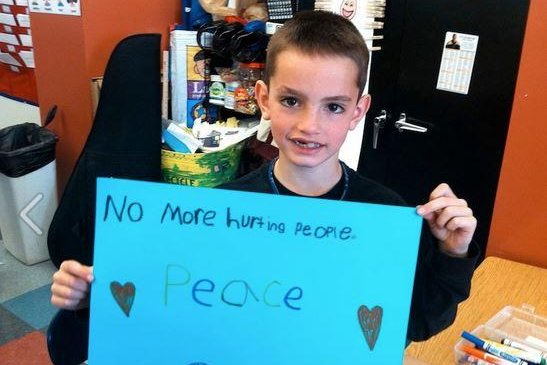Martin William Richard, 8, died on April 15, 2013 when the second of two pressure cooker bombs detonated near him at the Boston Marathon. Medical testimony about the boy's death was a key element of prosecutors' case during the trial of Dzhokhar Tsarnaev, who was convicted in the attacks on April 8, 2015. Photo: RIP Martin Richard/Facebook
BOSTON, April 17 (UPI) -- The parents of an 8-year-old boy who was killed at the 2013 Boston Marathon, when one of two pressure cooker bombs exploded near the finish line, say they are satisfied that Dzhokhar Tsarnaev was served with justice. However, they do not want him to be executed -- which has been prosecutors' plan all along.
A printed appeal from Bill and Denise Richard, which appeared on the front page of the Boston Globe Friday, expressed a deep thanks to everyone who had a hand in Tsarnaev's conviction -- and illustrated how they have been trying to move forward with life over the last two years.
"The past two years have been the most trying of our lives," they said. " Our family has grieved, buried our young son, battled injuries, and endured numerous surgeries -- all while trying to rebuild lives that will never be the same."
Eight-year-old Martin William Richard died on April 15, 2013 as he stood near the finish line. He survived the first explosion, but not the second. During the trial against Tsarnaev, prosecutors admitted the tattered and bloody clothing the boy was wearing that day as an evidence exhibit.
On March 30, prosecutors rested their case against Tsarnaev following explicit testimony from medical examiner Henry Nields about the last moments of Richard's life -- testimony that reduced some jurors to tears.
Nields described the damage done to Richard by the second pressure cooker bomb -- nails, pieces of plastic, round pellets, pieces of wood and shards of exploded metal that viciously invaded the boy's 4-foot-5 frame. When asked if the boy died a painful death, Nields said simply, "yes."
"We sat in the courtroom, day after day, bearing witness to overwhelming evidence that included graphic video and photographs, replicated bombs, and even the clothes our son wore his last day alive," the Richards said in their open letter Friday.
In addition to losing their young son, the Richard family also endured the hospitalization and recovery of their 7-year-old daughter, as well, who was badly wounded in the attack.
Tsarnaev was convicted last week on all 30 criminal counts against him, which included four counts of murder for Richard's death -- and the deaths of Krystle Campbell, 29, Lingzi Lu, 23, and Massachusetts Institute of Technology police officer Sean Collier, 27.
Defense attorneys never claimed or attempted to prove that Tsarnaev was not involved in the attacks. Rather, they argued that he participated in the plot largely due to the influence of his older and more radical brother, Tamerlan -- who was killed in a shootout with police three days after the bombings.
Prosecutors had been seeking the death penalty all along. But Friday, Bill and Denise Richard voiced their opposition to capital punishment and instead asked government prosecutors to take it off the table. The reason, they say, is because such a sentence would continue to drag on in the courts and prevent their family from the healing process.
"We are in favor of and would support the Department of Justice in taking the death penalty off the table in exchange for the defendant spending the rest of his life in prison without any possibility of release and waiving all of his rights to appeal," they said. "We know that the government has its reasons for seeking the death penalty, but the continued pursuit of that punishment could bring years of appeals and prolong reliving the most painful day of our lives.
"As long as the defendant is in the spotlight, we have no choice but to live a story told on his terms, not ours.The minute the defendant fades from our newspapers and TV screens is the minute we begin the process of rebuilding our lives and our family."















